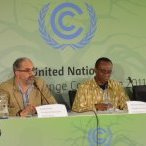
28 November 2011 | Videos | Climate Justice and Energy | COP 17
Lack of Commitment
Friends of the Earth press conference at the kick-off of the UN climate talks in Durban
Download: MP3 (5.8 Mb)
Environmental federation Friends of the Earth International (FoEI),with 76 member groups around the world, expressed great concern over the developed countries attempt to undermine the international framework under which these countries must reduce their greenhouse gas emissions.
FoEI’s warning comes at the beginning of the United Nations climate talks in South Africa. “Whilst the greenhouse gas emissions targets in the current phase are extremely weak and full of dangerous loopholes like carbon trading, the Protocol itself provides the only existing international framework for legally binding targets for developed countries to reduce their greenhouse gas emissions”, reads a press release published by FoEI today.
The text continues saying: “Rather than strengthen the emissions targets and cut out the loopholes to galvanize real action on climate emissions, the US, Japan, Canada and other developed countries are pushing to scrap the agreed, legally-binding framework to cut emissions and replace it with a voluntary ‘pledge and review’ approach”.
Friends of the Earth International also held a press conference on Monday at the media center of the Durban International Conference Center, where the UN official negotiations on climate change began.
The 17th Conference of the Parties (COP17) “is a very significant moment in the struggle to save the planet and the people and it’s very significant also that this conference is taking place in Africa. Africa is the most hit besides the small island states when it comes to the global warming issue", said Bassey.
"The impacts are already manifesting on the continent, so we are not speaking of what will happen in 5 years or ten years we are talking about what is going on right now. [...]We are speaking about droughts, we are talking about climate environmental refugees already in the continent. We are talking about floods, we are talking about crop failures, desertification, mudslides”.
The 17th Conference of the Parties (COP 17) is a significant moment in the struggle to save the planet and its peoples, said Nnimmo Bassey, who is especially concerned about the impacts of the climate crisis that are already being felt in Africa.
The Nigerian leader highlighted that several developed nations, especially the United States, have promoted the idea that we should not expect to see legally binding agreements on emissions reduction at the COP. “We are so disappointed that countries like Japan, like Canada, Australia and Russia will join on this trend. This crisis is something that every nation should confront with all seriousness because we just have one planet”, said Bassey.
Meanwhile, former chair of Friends of the Earth International, Meena Raman, pointed out that the countries need to agree a second commitment period of the Kyoto Protocol in Durban (the first commitment period ends in late 2012) without any conditions, to strengthen polluting emissions reduction.
“I think this is the most important outcome, that’s what we want and what we demand”, said the representative of Friends of the Earth Malaysia. “However, what we see happening is that this would not be likely because the Annex 1 parties to the Kyoto Protocol are conditioning that they will only make the second commitment period if there is another legally binding treaty under the Convention”, she added.
Raman highlighted the push of Japan, Australia and the United States to replace the legally binding obligations under Kyoto Protocol with a voluntary “pledge and review” agreement.
Meanwhile, activist Lucia Ortiz, of Friends of the Earth Brazil, strongly rejected the push for carbon markets and offsetting mechanisms used by the Northern countries to avoid reducing their domestic emissions.
She criticized Clean Development Mechanisms (CDM) established under the Kyoto Protocol, which have led to polluting projects with serious social impacts in the Global South. She also highlighted the negative effects of dams, large-scale forestry monoculture plantations and waste incineration, and she questioned the idea of expanding carbon markets to agriculture.
She also talked about the Green Climate Fund agreed at the last COP held last year in Cancun, Mexico. The Fund “should be operationalized here, restricting if not excluding totally the role of the World Bank with no private sector and no role for the carbon markets as sources”.
Bobby Peek, director of groundWork/Friends of the Earth South Africa, also spoke at the press conference. He mainly focused on the role of the South African government on issues related with climate change in a country whose energy production is based on coal and which has a strong presence of transnational corporations as main beneficiaries of its development model.







